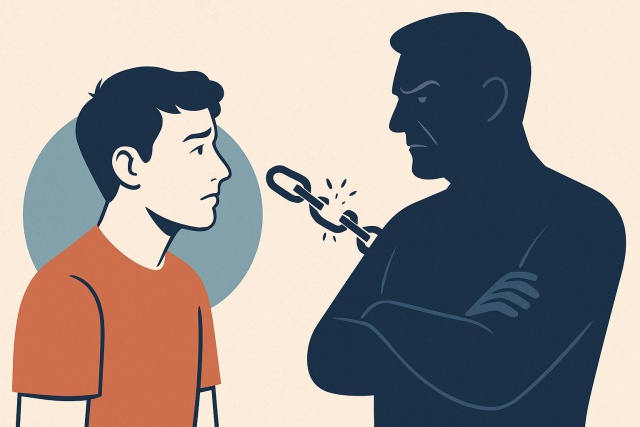
Signs of a Toxic Relationship You Should Watch For
Spotting the signs of a toxic relationship early can save your emotional health. Discover key red fl...
This guide offers no-nonsense easy-to-follow steps for talking to a narcissist while holding on tight to your sense of self and keeping your emotional health in check.
Talking with a narcissist can sometimes feel like walking a tightrope where one wrong move might knock your sense of self out from under you. They have a knack for hijacking conversations and twisting your words until they sound like something you never intended. They also completely brush off how you actually feel. That is exactly why holding onto your identity and putting up clear emotional boundaries is key.
Narcissists often have an inflated sense of their own importance, paired with a strong craving for admiration that’s hard to miss. They usually show very little empathy toward others, which can leave people feeling a bit cold or dismissed.
Narcissists have this knack for chipping away at your confidence, often by dismissing your feelings and twisting the facts just enough to keep themselves in the driver’s seat. They love to dominate conversations, which can easily spiral into a codependent dance where you find yourself carrying the weight of their emotions while your own take a backseat. This tricky dynamic can slowly erode your personal boundaries, making you second-guess your own worth and perspective.
"Holding on to your sense of self when tangled up with toxic personalities isn’t just a matter of self-love—it often feels like the lifeline you cling to for protecting your emotional well-being."
It’s a good idea to pause for a moment and center yourself. Be clear about what you want to get out of the encounter. I’ve found that running through your responses in your head beforehand can really make a difference. Keep an eye out for any sneaky manipulations and don’t hesitate to lean on calming techniques like deep breaths—they work wonders.
It’s vital to lay out what you will and won’t tolerate. Make it a point to set those boundaries upfront before any drama has a chance to brew. Be ready to hold your ground like a champ. Taking this route not only protects your emotional well-being but also sends a clear message to the narcissist that their usual tricks won’t work this time.
Dealing with a narcissist definitely calls for finesse in communication—something that helps keep the peace and preserve your dignity. Try to stay calm and neutral while avoiding big emotional reactions. Listen with intention to help ease the tension.

Conversations with a narcissist can often leave you feeling emotionally drained and frankly a bit rattled. It is vital to tune into these reactions and find ways to process them healthily—your mental well-being deserves that care. Try to discover activities that help you bounce back and reclaim your emotional footing.
Sometimes no matter how hard you try the narcissist's behavior crosses into toxic or abusive territory that is tough to tolerate. When you spot signs like ramped-up manipulation or veiled threats and relentless boundary stomps it is usually a clear signal to hit the pause button. This could mean wrapping up conversations sooner than you would like, dialing back contact or in some cases cutting ties altogether.
| Narcissist Behavior Sign | Recommended Response | When to Cut Contact |
|---|---|---|
| Persistent gaslighting | Stay grounded and jot down key conversations to keep your sanity intact | If gaslighting seriously starts taking a toll on your mental health |
| Refusal to respect stated boundaries | Lay down clear consequences and stick to them no matter what | After repeated boundary violations show zero sign of stopping |
| Escalation into insults or threats | Step back immediately and lean on your support network for backup | If threats ramp up or you start feeling unsafe in any way |
| Emotional exploitation for control | Be cautious with what you share and keep a healthy emotional distance | If the manipulation becomes overwhelming and too heavy to bear |
| Circular blaming and refusal to take responsibility | Keep the focus strictly on facts and avoid getting pulled into the drama | When conversations drain you or cross into harmful territory |
| Constant need for admiration detracting from your needs | Cut down on time spent and don’t feed their endless appetite for praise | If one-sided interactions leave you feeling utterly wiped out |
If you are looking to build stronger boundaries and bounce back from narcissistic relationships, diving into books like "Disarming the Narcissist" by Wendy T. Behary and "Will I Ever Be Free of You?" by Karyl McBride can be surprisingly enlightening. Online, the Out of the FOG website is a gem—it’s packed with helpful articles and buzzing forums that actually feel alive with support.
Pushback is common since they love to test if you really mean business. The trick is to stay calm and stick to the consequence you laid out like simply walking away. Their reaction often proves why you needed that boundary in the first place. Keep your safety front and center and remember you’re not responsible for how they react emotionally.
Gaslighting happens when someone denies what you know is true or twists facts to make you doubt your memory. You might feel confused, apologize more than you should, or doubt your sanity. Trust your gut. It helps to jot down notes after these conversations to keep track of your side because your perspective matters.
Since they usually lack empathy and crave control, a truly balanced exchange is rare. The goal isn’t to change them—that’s a tall order—but to protect yourself. Focus on managing the interaction carefully to minimize emotional damage rather than chasing mutual understanding.
Keep your statements focused on your feelings without blame. For example, say, "I feel overwhelmed when voices get raised so I need to pause this conversation" or "I see things differently and need my view to be respected." This keeps the spotlight on your experience and makes it harder for them to argue.
Consider cutting ties when your interactions leave you feeling hurt, manipulated, or traumatized especially if your boundaries are repeatedly ignored. It’s vital if there’s any hint of threat or abuse. Your emotional and physical safety should always take top priority.

Spotting the signs of a toxic relationship early can save your emotional health. Discover key red fl...

Discover how narcissistic father traits shape family dynamics, affect emotional well-being, and infl...

Trauma bonding can trap you in confusing relationships that feel like love but cause pain. Learn the...

Discover the 7 critical signs of a narcissistic father and how understanding these behaviors empower...